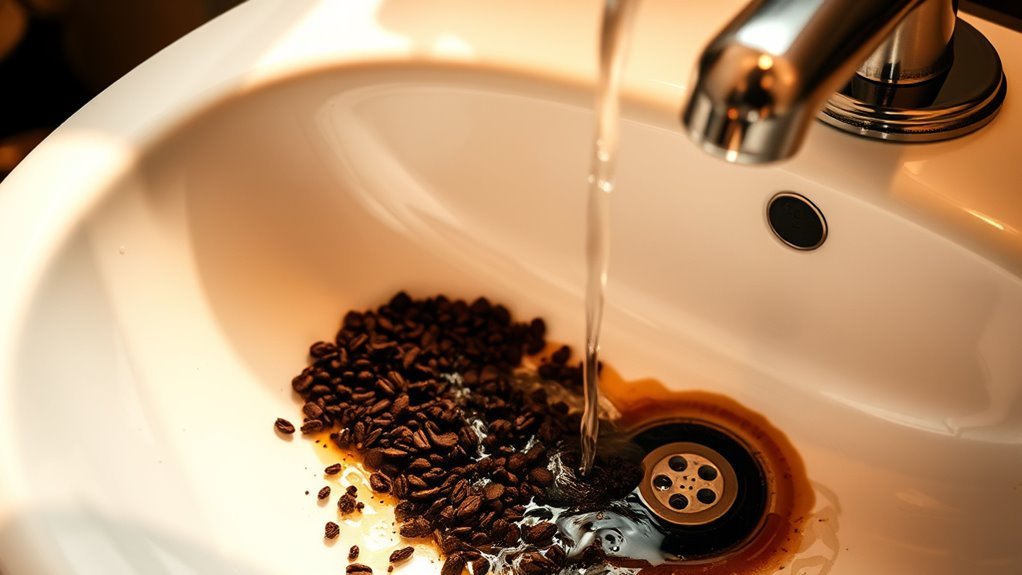Can You Flush Coffee Grounds
You shouldn’t flush coffee grounds down the toilet. Doing so can lead to significant plumbing issues like clogs, slow drainage, and expensive repairs. Flushing also contributes to water pollution and strains sewage systems. Instead, consider composting the grounds or using them as a fertilizer for your garden. They enrich soil and encourage beneficial microbial activity. If you’re curious about more eco-friendly practices and creative ways to reuse coffee grounds, there’s definitely more to explore.
Understanding Coffee Grounds and Their Composition
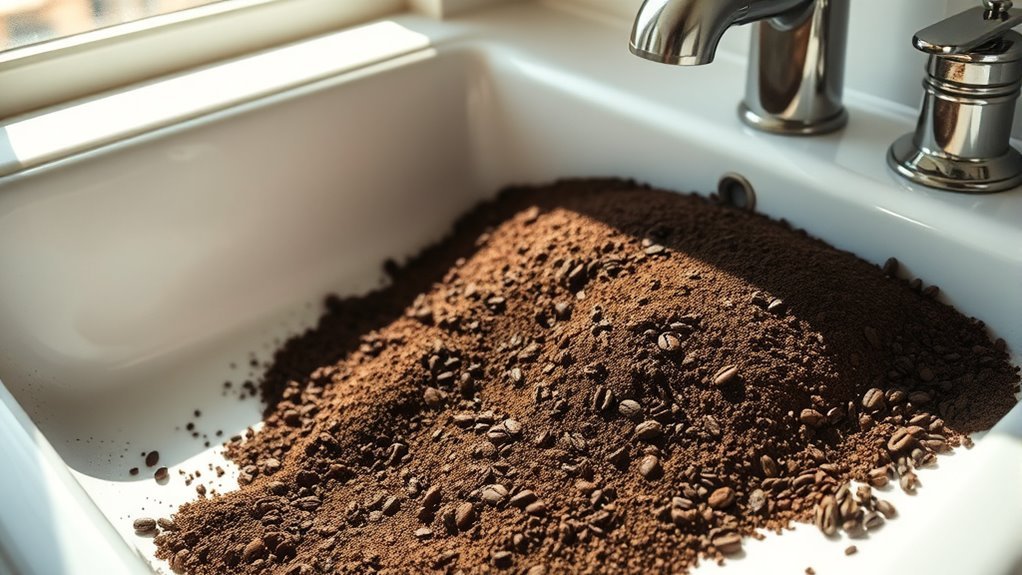
Coffee grounds, the byproduct of brewing your favorite morning beverage, have a complex composition that can impact their disposal methods. Primarily, the coffee composition includes organic compounds, oils, and cellulose, which contribute to their unique texture. This texture can vary considerably based on the brewing method, resulting in fine or coarse grounds. Understanding this variability is essential, as it affects not only how you might reuse or recycle the grounds but also how they interact with your waste disposal systems. The organic nature of coffee grounds makes them suitable for composting, enriching soil with nutrients. So, before deciding how to dispose of your used coffee, consider their composition and texture; it can offer sustainable alternatives beyond mere disposal.
The Risks of Flushing Coffee Grounds
Flushing coffee grounds can lead to significant plumbing issues, as they tend to accumulate and cause clogs in your pipes. Additionally, there’s an environmental concern, as flushing waste can contribute to water pollution and strain sewage systems. It’s crucial to evaluate these risks before deciding to dispose of coffee grounds in this manner.
Clogging Pipes Issue
While it may seem convenient to discard coffee grounds by flushing them down the toilet, doing so poses significant risks to your plumbing system. Coffee grounds can accumulate and create clogs in your pipes, leading to costly plumbing issues. When mixed with other debris, they form a sludge that can obstruct water flow, making pipe maintenance more challenging. Over time, these clogs can necessitate invasive plumbing solutions, such as snaking or hydro-jetting, which can be both time-consuming and expensive. Instead of flushing, consider composting or discarding coffee grounds in the trash. By doing so, you’ll protect your plumbing and reduce the risk of unexpected repairs, ensuring your system remains functional and efficient for years to come.
Environmental Impact Concerns
The decision to flush coffee grounds isn’t just a plumbing concern; it also has significant environmental implications. By flushing these grounds, you might inadvertently contribute to larger waste management issues. Consider the following:
- Coffee grounds don’t decompose easily in wastewater systems.
- They can lead to increased water treatment costs.
- Flushing contributes to pollution in waterways.
- Sustainable practices focus on composting rather than disposal.
Embracing sustainable practices helps reduce environmental harm and promotes responsible waste management. Instead of flushing, think about alternative uses for coffee grounds. By making informed choices, you support a healthier ecosystem and can enjoy the freedom of contributing positively to the environment.
How Coffee Grounds Cause Plumbing Issues
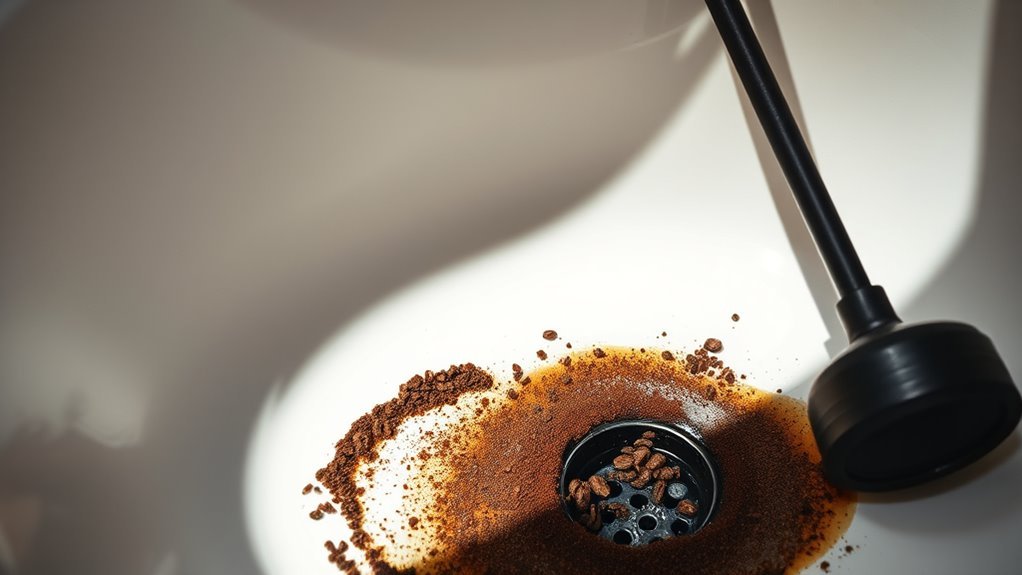
When you flush coffee grounds, you’re introducing a substance that can easily clog pipes and accumulate in drains. Over time, these grounds can mix with grease and other debris, forming sludge that obstructs water flow. Understanding these potential issues can help you maintain a healthier plumbing system.
Clogging Pipes Potential
Although coffee grounds might seem harmless, they can considerably contribute to plumbing issues over time. When you flush them, you’re increasing the clogging risks in your pipes. Here’s how coffee grounds affect your plumbing:
- Particle Size: Coffee grounds are fine and can easily accumulate in pipes.
- Grease Interaction: They can mix with grease, forming clogs that are difficult to dislodge.
- Drainage Issues: Over time, this buildup can slow down drainage, leading to backups.
- Plumbing Maintenance: Regular maintenance becomes more essential to prevent significant blockages.
To maintain a free-flowing plumbing system, avoid flushing coffee grounds. Instead, consider composting or discarding them in the trash. Protecting your pipes guarantees you enjoy the freedom of a functional home.
Accumulation in Drains
Flushing coffee grounds can lead to significant accumulation in drains, intensifying plumbing issues over time. When you dispose of coffee grounds this way, they don’t dissolve; instead, they clump together and settle in pipes. This accumulation can restrict water flow, creating a breeding ground for clogs. Regular drain maintenance becomes essential as coffee grounds build up, increasing the risk of blockages. To avoid these headaches, focus on clog prevention by disposing of coffee grounds in the trash or compost instead. By being mindful of what goes down your drain, you can maintain a smoothly functioning plumbing system and enjoy the freedom of hassle-free drainage. Remember, a little care goes a long way in preserving your plumbing health.
Grease and Sludge Formation
If you’re disposing of coffee grounds down the drain, you might inadvertently contribute to the formation of grease and sludge in your plumbing system. Coffee grounds can combine with fats and oils, leading to significant plumbing issues. Here’s how:
- Grease buildup occurs when oils cling to the inner walls of pipes.
- Sludge accumulation happens as coffee grounds settle and mix with grease, forming a thick paste.
- Small particles can create larger clumps, obstructing water flow.
- Over time, this can lead to severe clogs and costly repairs.
Understanding this process is essential. By avoiding flushing coffee grounds, you can maintain a free and efficient plumbing system, preventing the headaches of grease and sludge-related issues.
The Environmental Impact of Flushing Waste
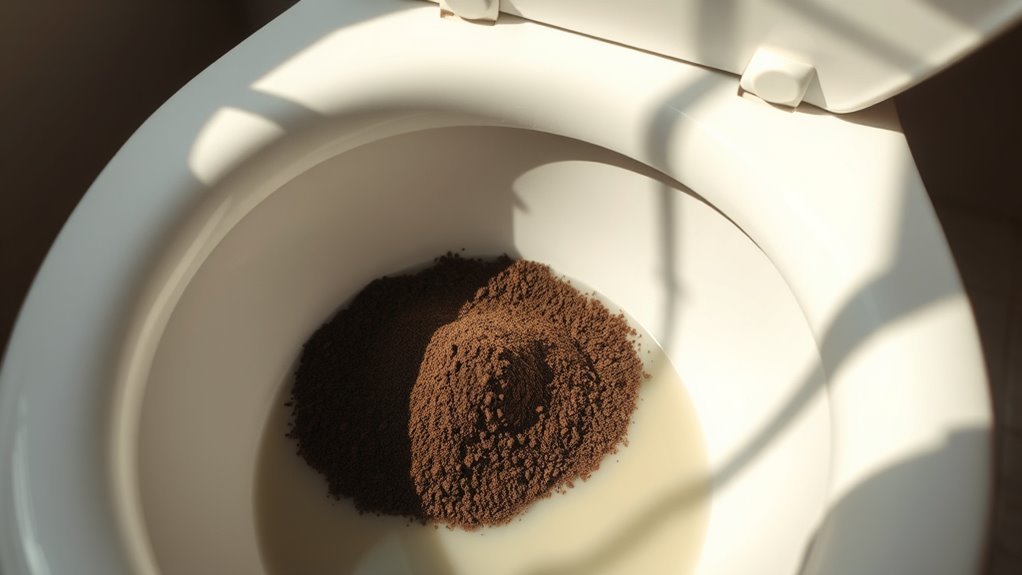
While many people might not consider the broader implications of their daily waste disposal habits, flushing items like coffee grounds can have significant environmental repercussions. This practice undermines environmental sustainability by straining waste management systems. When coffee grounds enter the sewage system, they can contribute to blockages and increased treatment costs, ultimately impacting local ecosystems.
| Impact Type | Description | Long-Term Effect |
|---|---|---|
| Water Pollution | Contaminants enter waterways | Harmful to aquatic life |
| Resource Drain | Increased treatment needs | Higher energy consumption |
| Soil Degradation | Nutrients lost in treatment | Reduced soil fertility |
Alternatives to Flushing Coffee Grounds
Instead of flushing coffee grounds down the toilet, evaluate several eco-friendly alternatives that can enhance your waste management practices. You can effectively recycle coffee in ways that benefit both you and the environment. Here are some alternatives to evaluate:
- Use as a natural fertilizer: Coffee grounds enrich your garden soil with nutrients.
- Deodorize: Place coffee grounds in your refrigerator or freezer to neutralize odors.
- Scrub surfaces: The gritty texture makes coffee grounds an effective scrub for cleaning pots and pans.
- Repel pests: Sprinkle grounds around your plants to deter pests like snails and slugs.
Composting Coffee Grounds
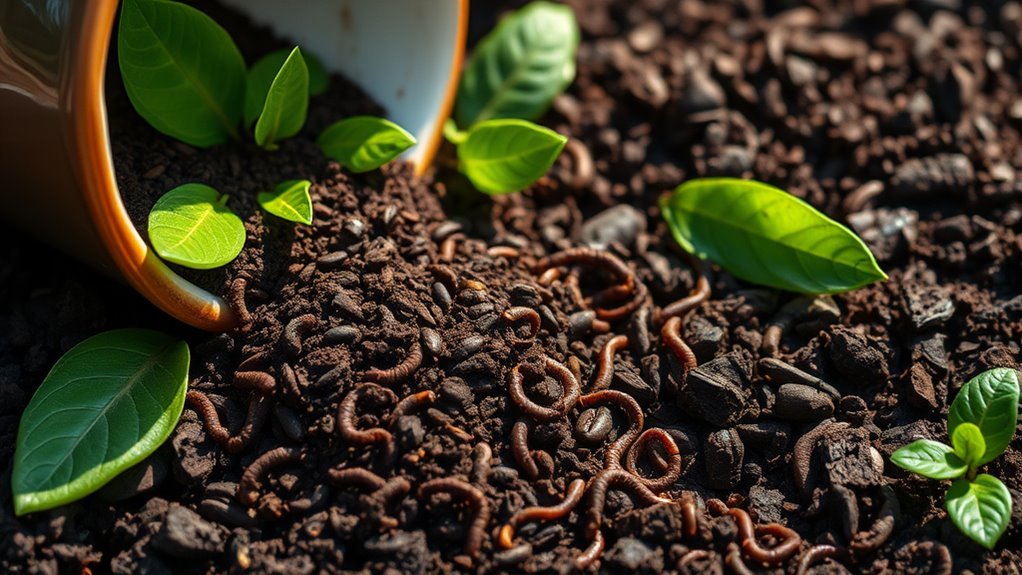
Composting coffee grounds is a sustainable practice that not only reduces waste but also contributes valuable nutrients to your garden. By incorporating these grounds into your compost bin, you’re adding rich organic matter that enhances soil health. You can use various composting techniques, such as layering the grounds with browns like leaves or cardboard, to create a balanced mix. This helps optimize microbial activity, ensuring efficient decomposition. Remember, coffee grounds are slightly acidic and high in nitrogen, making them an excellent addition to your compost. Just be mindful not to overdo it; moderation is key. With these practices, you’ll not only minimize waste but also foster a thriving garden ecosystem, empowering you to cultivate a healthier environment.
Using Coffee Grounds in Gardening
Using coffee grounds in your garden can offer significant benefits, as they serve as a nutrient-rich fertilizer that enhances soil quality. Additionally, their natural pest deterrent properties can help protect your plants from unwanted insects. By incorporating coffee grounds into your gardening routine, you can promote healthier growth while reducing pest issues.
Nutrient-Rich Fertilizer
Although many people toss coffee grounds in the trash, they can actually serve as a nutrient-rich fertilizer for your garden. By incorporating coffee grounds into your soil, you’re providing numerous nutrient benefits that enhance its overall quality. Here’s how coffee grounds contribute to soil enhancement:
- Nitrogen Source: They add essential nitrogen, promoting healthy plant growth.
- pH Balance: Coffee grounds help to neutralize acidic soils.
- Microbial Activity: They encourage beneficial microbes, improving soil structure.
- Moisture Retention: Coffee grounds retain moisture, reducing the need for frequent watering.
Using coffee grounds not only reduces waste but also empowers you to cultivate a flourishing garden. Embrace this sustainable practice and watch your plants thrive!
Pest Deterrent Properties
When it comes to keeping pests at bay in your garden, coffee grounds offer a natural and effective solution. These grounds serve as a pest deterrent, repelling various insects like slugs and snails. Sprinkling coffee grounds around your plants creates a barrier that many pests find uninviting. Additionally, the strong scent of coffee acts as a natural repellent, discouraging unwanted critters from invading your garden space. Not only do coffee grounds help control pests, but they also enrich your soil, giving your plants the nutrients they need to thrive. By incorporating this simple yet powerful tool into your gardening routine, you embrace a more natural approach to pest management, allowing you to cultivate a healthier and more vibrant garden.
Creative Ways to Reuse Coffee Grounds
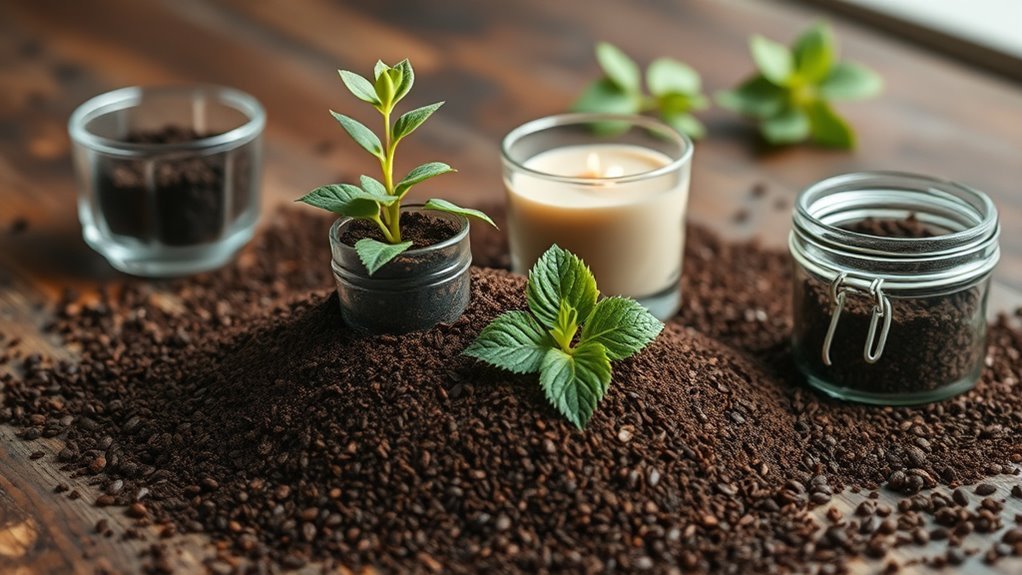
Coffee grounds, often discarded as waste, can actually be transformed into valuable resources for a variety of creative uses. By harnessing their unique properties, you can engage in environmentally friendly activities that enhance your lifestyle. Consider these ideas:
- Coffee ground crafts: Create textured art pieces or unique home decor items using the rich color and gritty texture of coffee grounds.
- Natural exfoliant: Use coffee scrub recipes to make DIY body scrubs that rejuvenate your skin while utilizing their abrasive nature.
- Odor neutralizer: Place dried coffee grounds in your fridge or shoes to absorb unpleasant smells.
- Fertilizer: Enrich your garden soil with the nitrogen and nutrients found in coffee grounds, promoting healthy plant growth.
These uses not only reduce waste but also spark creativity.
Best Practices for Waste Disposal
While finding creative ways to reuse coffee grounds is one approach to waste management, understanding best practices for waste disposal is equally important. You should avoid flushing coffee grounds down the toilet, as they can clog pipes and create costly plumbing issues. Instead, consider composting your coffee grounds, as they enrich soil and provide nutrients for plants. If composting isn’t an option, placing them in your organic waste bin is a responsible choice. Additionally, check local regulations regarding coffee ground disposal, as waste management practices can vary by location. By adhering to these guidelines, you’ll guarantee that your coffee grounds are disposed of in an environmentally friendly manner, ultimately contributing to a more sustainable waste management system.
Summary of Safe Disposal Methods
Although many people may consider flushing coffee grounds down the toilet, there are safer and more effective methods for disposal. Choosing eco-friendly alternatives can greatly benefit both your plumbing and the environment. Here are some recommended methods for coffee ground disposal:
- Compost: Add your coffee grounds to a compost pile to enrich the soil with nutrients.
- Garden Fertilizer: Sprinkle used grounds directly onto your plants as a natural fertilizer.
- Waste Bin: Collect grounds in a biodegradable bag and dispose of them in your regular trash.
- DIY Scrub: Use coffee grounds as a natural abrasive scrub for cleaning surfaces.
These methods promote eco-friendly practices while ensuring your plumbing remains clog-free.
Frequently Asked Questions
Can I Flush Coffee Grounds Down a Septic System?
Flushing coffee grounds down a septic system isn’t advisable. They can lead to plumbing issues, as the grounds accumulate and create clogs over time. Septic systems rely on a balanced environment to break down waste, and adding foreign materials disrupts this process. Instead of flushing, consider composting or disposing of coffee grounds in the trash. This way, you’ll maintain your septic system’s efficiency and avoid costly repairs in the future.
Do Coffee Grounds Decompose Quickly in Water?
When considering coffee ground decomposition in water, it’s essential to recognize that they don’t break down quickly. Their water absorption rates can vary, but generally, they tend to clump together, making it hard for them to decompose effectively. While some organic materials dissolve or break down rapidly in water, coffee grounds tend to linger, potentially leading to blockages or other issues. So, it’s best to dispose of them properly instead of relying on water decomposition.
What Happens if I Accidentally Flush Coffee Grounds?
If you accidentally flush coffee grounds, you might find yourself facing plumbing issues down the line. Think about it—those tiny particles can clump together and create blockages in your pipes, disrupting waste management. While they seem harmless, they don’t break down easily in water, leading to costly repairs. It’s a small mistake with potentially big consequences, so it’s best to dispose of coffee grounds in your compost or trash instead.
Are All Types of Coffee Grounds Safe to Flush?
Not all types of coffee grounds are safe to flush. While some may seem harmless, they can lead to plumbing issues over time, as they accumulate and create blockages. Additionally, flushing coffee grounds contributes negatively to environmental impact, as waste management systems struggle to process them. To maintain your plumbing and protect the environment, it’s better to dispose of coffee grounds in compost or trash instead of flushing them down the toilet.
Can Coffee Grounds Harm Local Wildlife if Flushed?
Flushing coffee grounds can pose significant wildlife impact and environmental concerns. When you dispose of them in this way, they can contribute to clogs in sewage systems, potentially leading to untreated waste entering natural habitats. This disrupts ecosystems and can harm local wildlife that depends on clean water sources. It’s crucial to contemplate alternative disposal methods, ensuring you protect the environment and maintain the delicate balance within local ecosystems.
